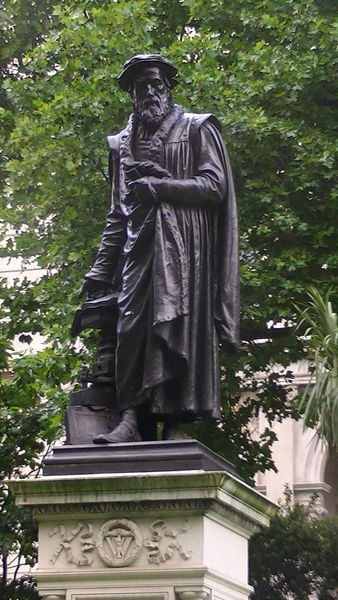What was so dangerous about wanting the bible, the word of God, to be translated into the language of the people?
Well, without getting into the theological arguments of the Reformation era, the ‘crime’ of Tyndale was as much political as it was religious. From at least the beginning of the Medieval period, if not before, the Church and State were to some extent indistinguishable. Many leading statesmen were also leading churchmen.
The Tudor dynasty for much of its history was in something of a precarious position, not least because its claim to the crown was fairly weak. The Bible was transmitted in Latin, which meant that most people were unable to understand it, let alone read it (most couldn’t read at all). And this was of great importance for the State and for the Church, who alone could interpret the scriptures to those who could not read or understand the Latin. It was a way of controlling the masses. It was about power.
Tyndale, on the other hand wanted the Bible to be in the language of the people so that, even if they couldn’t read they could hear and understand. Tyndale said that he wanted everyone, from the King to the Plough boy to be able to hear the scriptures in order that they may have the hope of salvation.
And that was why he was the most dangerous man in Tudor England, because his translation could be used to threaten the power of the Church and of the monarchy.
And so, Tyndale fled abroad, initially to Germany where his New Testament, in English was printed in the thousands and sent back to England. He was constantly on the run from the forces of Henry VIII, and of the Holy Roman Emperor. It was the latter that finally caught up with him in Belgium.
Today, there is only one complete copy of his New Testament in existence, so dangerous was this document perceived that the rest were rounded up and destroyed – and those found in possession of it could be imprisoned, tortured, and even in some cases put to death.
But the language of Tyndale lived on. Just a few years later Henry VIII, ironically, decided to have a translation of the Bible in English placed in every parish church in the land. At this time Henry was under the influence of Thomas Cromwell and other leading Protestants, and the experiment was sort-lived. But the translation that was placed in every parish church is attributed to Miles Coverdale, but much of it, particularly the New Testament, was based upon the translation of Tyndale. And this found its way into the King James Version (or Authorised Version) much later, which many of you will be familiar with (84% of which comes directly from Tyndale’s translation).
It had been argued that there were two people who are largely responsible for the development of the modern English language as we know it. One of them you will all have heard of, William Shakespeare. The other is William Tyndale. And if you haven’t heard of him, you will certainly have heard and probably used the idioms that, you may be surprised to know, actually come from his translation of scripture. Phrases like:
‘To lick the dust’
‘fall flat on his face’
‘rise and shine’
‘the sign of the times’
And my favourite: ‘eat, drink and be merry’
And many more.
As we give thanks for William Tyndale, we lament the death of all the martyrs, and pray for greater understanding, compassion and Christian love for all our brothers and sisters, with whom we might not completely agree, but with whom we share a common love of God made human in Christ Jesus, revealed Scripture.
Amen.
Fr Colin Lawlor
Illustration. Memorial, London Embankment.
© Adam Bishop, CC BY-SA 3.0 via Wikimedia Commons
This sermon was delivered by Fr Colin on Wednesday 7th October to mark the anniversary of the execution of William Tyndale, the translator of the Bible into the English language.
On October 6th 1536 a man was taken from his prison cell in Antwerp, which had been his wretched home for some 18 months, and led out to be publically burnt at the stake, a horrific death. True, as an act of clemency he was strangled before this horrific, torturous death, but it was botched and he came to as the flames began to take hold. He faced his end according to witnesses with incredible bravery and stoicism.
Melvyn Bragg, in his television documentary about this man, referred to him as the ‘most dangerous man in Tudor England’. He is commemorated in the Church of England on October 6th (yesterday) and yet I suspect few people have ever heard of him or, if they have, know little about his extraordinary life.
This man was William Tyndale, and his ‘crime’ was translating the Bible into the English language.
This might sound very odd to modern ears, but his age was the time of the Reformation, a period of history which led to many martyrs, both Catholic and Protestant, men and women who held firm to their understanding of the Christian faith in the face of great hardship, punishment and, in the case of many the ultimate sacrifice.
October is a month when a number of these are commemorated, which is why I want to say something about them, but particularly about Tyndale, today.





